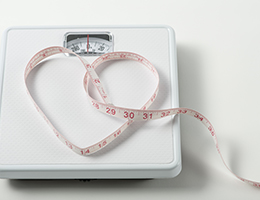
There are myriad benefits to getting to and maintaining a healthy weight. You'll have more energy. You'll lower your risk of developing joint problems down the road. And you may even enjoy better sleep.
But here's a really big benefit: You'll be at a decreased risk for heart disease, the No.1 killer in the U.S.
How extra weight puts the heart at risk
According to the American Heart Association and other health experts, being overweight can lead to:
High cholesterol. High blood cholesterol levels can, along with other substances, cause a fatty substance called plaque to build up inside the arteries of the heart. Plaque can narrow the arteries and make blood clots more likely. If a clot forms, it could block an artery and cause a heart attack or stroke. Obesity can also lower HDL, which is the good cholesterol that actually helps protect your heart.
Type 2 diabetes. Most people who have this form of diabetes are overweight or obese. Diabetes increases heart disease and stroke risks, even when it is well-controlled.
High blood pressure. Your risks for heart attack and stroke go up with elevated blood pressure levels. High blood pressure usually doesn't cause any symptoms, so you may not know you have it until you become seriously ill.
Sleep apnea. This causes a person to stop breathing repeatedly during sleep or to breathe irregularly. Left untreated, it can lead to problems such as diabetes and heart disease. Snoring or gasping during sleep and excessive daytime sleepiness are all symptoms of sleep apnea.
Does your weight put you at risk?
Doctors use body mass index, or BMI, to estimate body fat. You can learn your BMI using this calculator. If your BMI is 25 or higher, you are considered overweight; a BMI of 30 or higher indicates obesity.
Where you carry excess weight also affects your risk.
Having too much fat around your waist puts you at greater risk for heart disease and other problems than having extra fat elsewhere, such as on the hips. If you're a woman with a waist measurement over 35 inches or a man with one over 40 inches, you are more likely to have diabetes, high blood pressure, low HDL cholesterol and other heart risks.
Turning risks around
If you need to lose weight, ask your primary care provider about a program that combines healthy diet choices and exercise. According to the National Institutes of Health, losing as little as 5% to 10% of your current weight can help lower your heart disease risk.
It's also good to know your numbers. That means measuring your waist circumference and keeping track of your weight and blood pressure and your cholesterol and blood sugar levels. When you lose weight, you may notice that these numbers improve.
You also may need to take less medication for conditions like high blood pressure and high cholesterol.
Reviewed 5/23/2022